Physical Address
304 North Cardinal St.
Dorchester Center, MA 02124
Physical Address
304 North Cardinal St.
Dorchester Center, MA 02124

Camping adventures await with 17 creative activities that transform your ordinary wilderness trip into an unforgettable outdoor experience you never imagined possible.
Like Robinson Crusoe discovering his island’s potential, you’ll find camping offers far more than just pitching a tent and calling it a night. Whether you’re working with a shoestring budget or simply want to embrace traditional outdoor skills, the wilderness becomes your playground and classroom combined. From mastering fire-building techniques passed down through generations to identifying free, foraged snacks, these seventeen activities will transform your basic campsite into an adventure basecamp that’ll keep you engaged from sunrise to starlight.
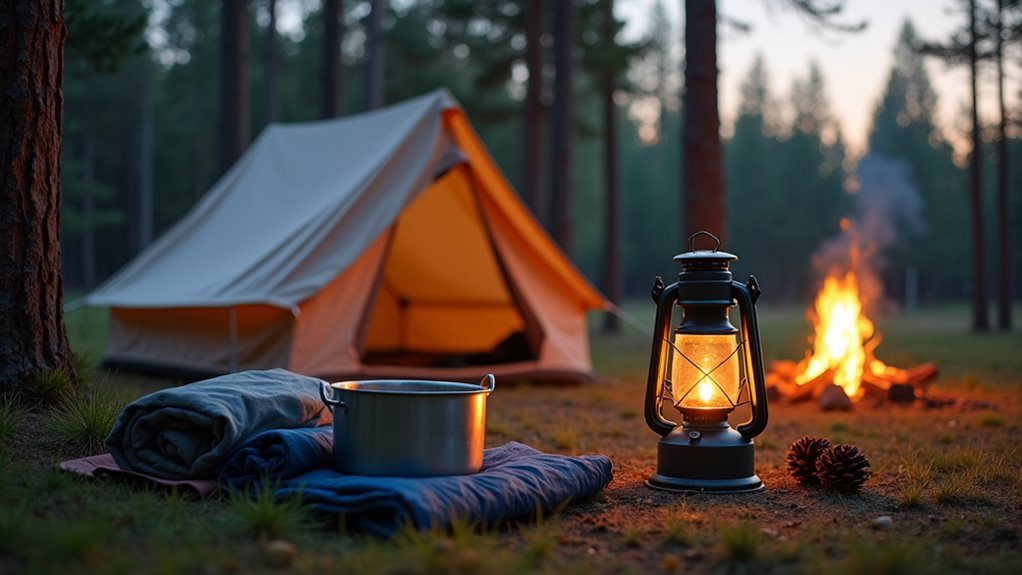
Before you can enjoy any camping adventures, you’ll need to establish a well-organized base camp that serves your needs without breaking your budget. Choose level ground away from water sources and dead trees. Set up your tent first, securing guy-lines properly to withstand wind.
Create designated zones for cooking, sleeping, and storage. Keep food in bear-proof containers or hang it properly—respecting local wildlife practices protects both you and animals. Organize gear systematically: frequently used items stay accessible, while backup supplies go deeper in storage.
Establish a camp kitchen downwind from your tent. Use existing fire rings when available rather than creating new ones. This preserves the natural environment and follows Leave No Trace principles that experienced campers embrace. If you’re cycling worldwide, ensure your bike is secured and positioned where it won’t obstruct camp activities or become damaged by weather.
Once your campsite’s established, exploring nearby trails becomes your gateway to discovering the area’s natural treasures without spending extra money. Check with park rangers or visitor centers for trail maps and difficulty ratings that match your fitness level. Start early morning when temperatures are cooler and wildlife is most active.
Pack essentials: water, snacks, first aid kit, and a whistle. Wear sturdy shoes with good traction. Download offline maps on your phone as backup navigation. Look for interpretive trails that offer educational signs about local flora, fauna, and cultural history.
Document your discoveries through photos or a hiking journal. Many trails lead to scenic overlooks, waterfalls, or historical sites that provide incredible photo opportunities and deeper connection to the region’s heritage. These family camping activities create lasting memories while encouraging everyone to appreciate the natural world together.
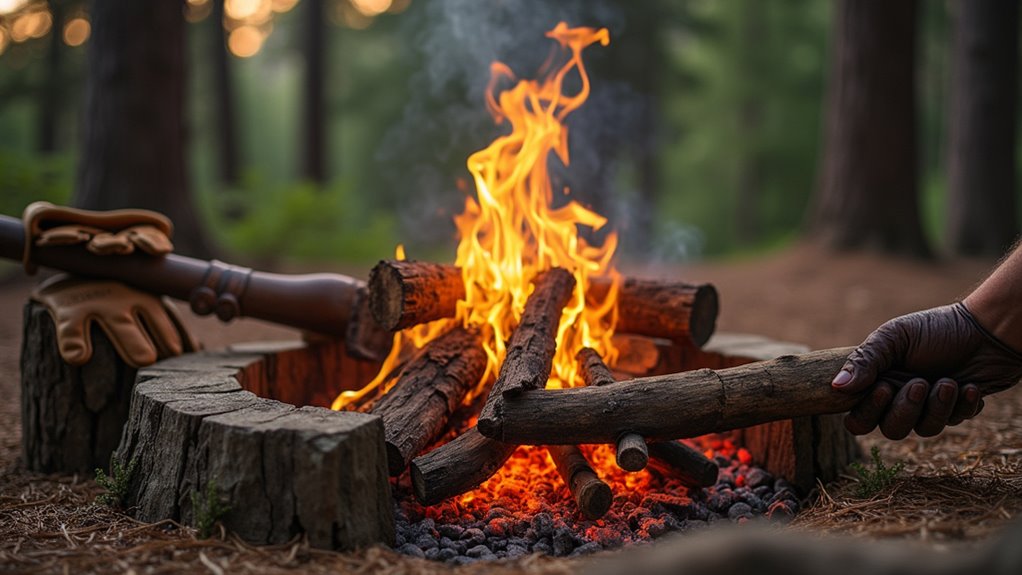
After spending the day exploring trails, gathering around a crackling campfire creates the perfect ending to your outdoor adventure. You’ll need three types of fuel: tinder (dry leaves, paper), kindling (pencil-thick twigs), and fuel wood (thumb-sized branches). Build your fire in designated fire rings to protect the environment and follow local regulations.
After a day of trail exploration, nothing beats gathering around a crackling campfire with proper tinder, kindling, and fuel wood in designated fire rings.
Start small with tinder, gradually adding larger materials as flames grow. Keep a bucket of water nearby for safety.
You’ll save money by collecting fallen branches instead of buying firewood, but check campground rules first.
Maintain your fire by adding fuel slowly and never leaving it unattended. The crackling sounds and warm glow provide free entertainment while you roast marshmallows, share stories, or simply enjoy nature’s ambiance. Consider downloading outdoor adventure apps to help you identify the best spots for firewood gathering and to navigate safely back to your campsite in low light conditions.
Cooking over an open fire transforms simple ingredients into memorable meals while connecting you to centuries-old traditions. You’ll need basic cast iron cookware, long-handled utensils, and heat-resistant gloves.
Start with simple dishes like foil packet vegetables, grilled meats, or one-pot stews that won’t break your budget.
Control heat by adjusting your food’s distance from flames. Create cooking zones using different coal temperatures—hot coals for searing, medium for steady cooking, and cooler edges for keeping food warm.
Wrap potatoes in foil and bury them in coals for perfect baked potatoes.
Plan meals using shelf-stable ingredients like rice, beans, and canned goods. Pre-cut vegetables at home to save time.
Foil packet cooking makes campfire meal preparation incredibly simple and requires minimal cleanup since everything cooks in its own sealed aluminum wrapper.
Always keep water nearby for safety and clean-up.
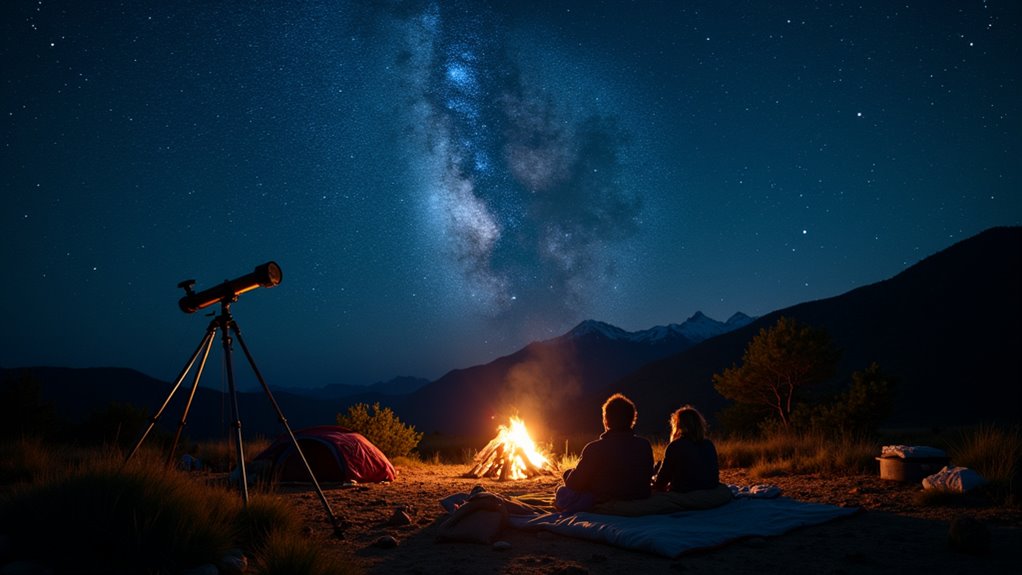
When darkness falls over your campsite, you’ll discover one of camping’s most spectacular free entertainment options. Away from city light pollution, the night sky reveals thousands of stars invisible from urban areas. Download a free stargazing app like SkyView or Star Walk before your trip to identify constellations, planets, and satellites. Bring a red flashlight to preserve your night vision while reading star charts.
Start with easy-to-spot constellations like the Big Dipper, Orion, or Cassiopeia depending on the season. Many cultures have created stories around these star patterns, making stargazing an educational family activity. Pack a blanket or reclining camp chairs for comfortable viewing.
Check astronomy websites for meteor showers, planetary alignments, or International Space Station flyovers during your camping dates. If you’re camping near a lake or river, consider that stargazing from the water offers an even more unobstructed view, and you might want to research whether renting a boat for a nighttime astronomy session would enhance your celestial viewing experience.
Fishing offers another peaceful way to connect with nature during your camping adventure, and most campgrounds sit near lakes, rivers, or streams perfect for casting a line. You’ll discover this timeless activity connects you with local traditions while providing fresh dinner options that’ll stretch your camping budget.
Discover how fishing transforms your camping trip into an authentic wilderness experience while saving money on meals.
Before you cast, research these essentials:
Even if you don’t catch dinner, you’ll enjoy hours of tranquil reflection while watching wildlife and absorbing the natural rhythm of waterside life. While summer camping offers traditional fishing opportunities, winter ski trips can also provide unique ice fishing experiences in frozen lakes and streams.
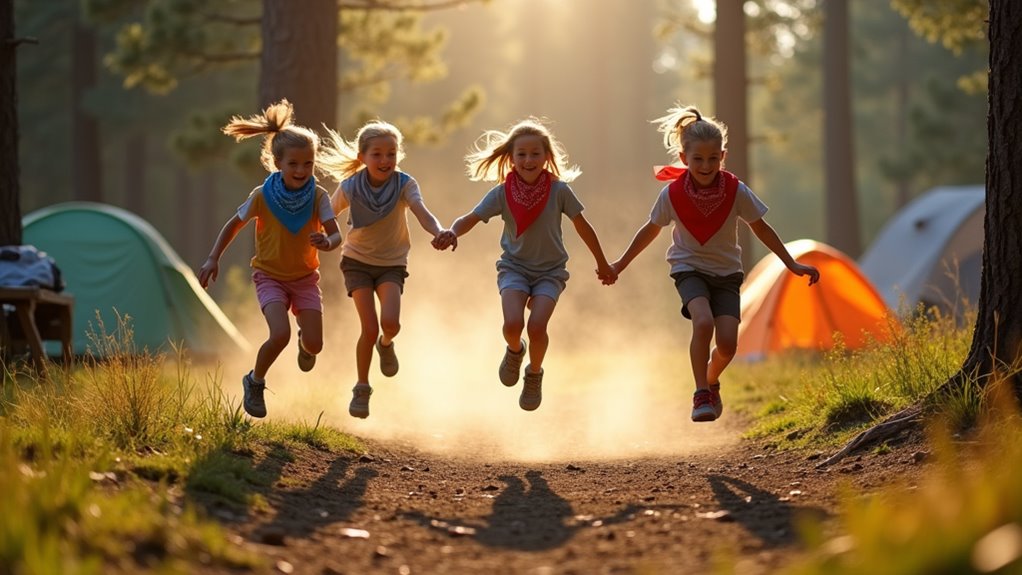
While nature provides endless entertainment, bringing along a few simple games transforms your campsite into a hub of laughter and friendly competition that’ll create lasting memories without breaking your budget.
Pack a frisbee, deck of cards, or football – these lightweight essentials cost under $20 total and provide hours of entertainment. Organize impromptu volleyball matches using a rope as your net, or challenge fellow campers to horseshoes with rocks as markers.
Evening card tournaments around the campfire connect you with camping’s social traditions while keeping everyone engaged after dark. Capture the flag works brilliantly across campsites, encouraging interaction with neighboring families.
These activities burn energy before bedtime and foster the community spirit that makes camping culture so special. For more adventurous campers, consider exploring thrilling outdoor activities that can elevate your camping experience beyond traditional games.
What transforms a simple fire into the heart of camp culture better than the ancient art of storytelling? You’ll discover that campfire tales create lasting memories without costing extra money. The flickering flames provide perfect ambiance for sharing adventures, folklore, or personal experiences.
Three Essential Storytelling Approaches:
You’ll find storytelling strengthens bonds between campers while preserving oral traditions. Keep tales appropriate for your group’s age and comfort level. Master storytellers know that memorable campfire stories require practice, timing, and the ability to read your audience’s reactions in the dancing firelight.
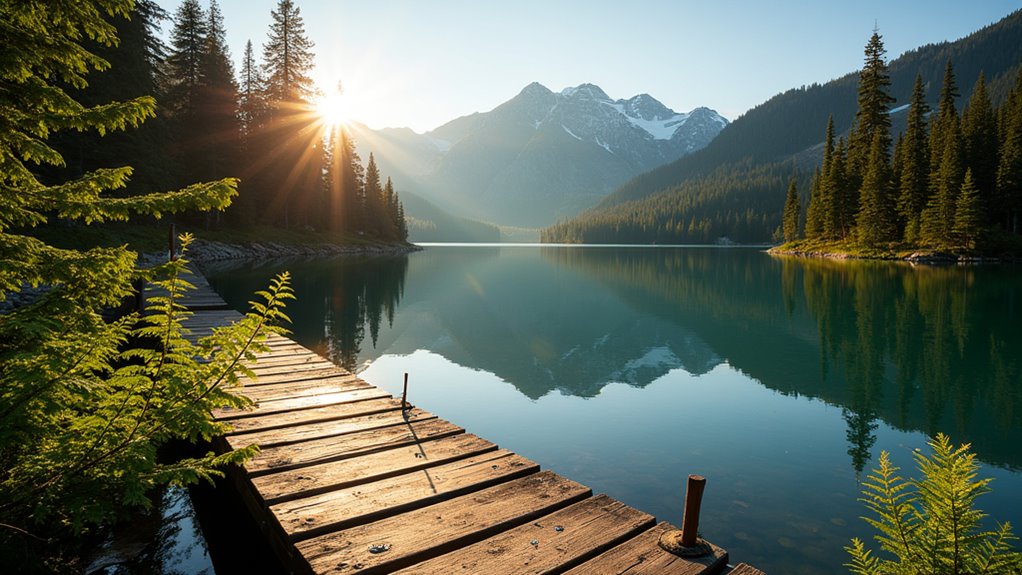
Countless photographers discover their passion through camping’s natural studio, where million-dollar landscapes cost nothing but your time and attention. You don’t need expensive gear—even smartphones capture stunning wilderness shots when you understand basic composition.
Wake before sunrise for golden hour magic, when soft light transforms ordinary scenes into masterpieces. Focus on details: dewdrops on spider webs, weathered bark textures, or wildflower close-ups. Wildlife photography requires patience—sit quietly and let animals approach naturally.
Learn your camera’s manual settings to control exposure in challenging lighting. Overcast days create perfect conditions for waterfall and forest photography, eliminating harsh shadows. Bring extra batteries since cold weather drains power quickly.
When photographing in bear country, maintain bear safety awareness by making noise and properly storing scented items like camera gear.
Document your camping memories while practicing technical skills that’ll serve you long after returning home.
Nothing beats the invigorating shock of natural water after a dusty hike or sweaty day setting up camp. Lakes, rivers, and streams offer free entertainment that’ll keep everyone refreshed and engaged for hours.
Before diving in, scout the area for hazards like rocks, currents, or drop-offs. Check local regulations since some areas restrict swimming to protect wildlife or water quality. Many campgrounds provide designated swimming areas with safer conditions.
Water Activities to Try:
For the ultimate adventure, consider exploring areas near glacier climbing trails where pristine glacial runoff creates incredibly clear and refreshing swimming holes.
Always swim with a buddy and respect Leave No Trace principles by using biodegradable soap downstream from water sources.
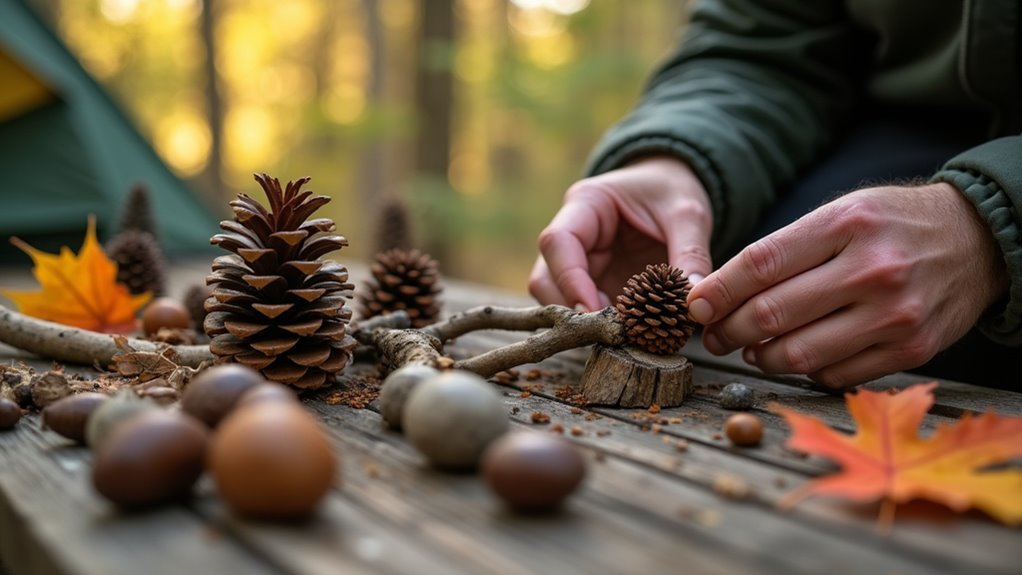
While you’re exploring your campsite surroundings, you’ll discover an abundance of natural materials perfect for hands-on crafting projects that won’t cost you a penny. Gather pinecones, smooth stones, interesting twigs, colorful leaves, and acorns to create nature-inspired artwork.
Kids can paint faces on rocks or build miniature fairy houses using bark and moss. Adults might weave grass into simple baskets or arrange pressed flowers between wax paper for bookmarks.
These activities connect you with traditional skills our ancestors relied upon while keeping children engaged for hours. Set up a dedicated crafting area on your picnic table and establish ground rules: only collect items already fallen on the ground to preserve the ecosystem.
Document your creations with photos before leaving them as gifts for nature. Many families staying at pet-friendly caravan parks find that nature crafting becomes a memorable bonding activity that both kids and pets can enjoy together.
Beyond crafting with natural materials, camping opens your eyes to the living creatures that call these wild spaces home. Bird watching and wildlife observation transform your campsite into a front-row seat to nature’s theater, requiring nothing more than patience and quiet observation.
Essential Wildlife Watching Tips:
Stay still, speak softly, and let the wilderness reveal its inhabitants naturally. You’ll discover camping’s most rewarding entertainment costs absolutely nothing. When planning winter camping expeditions, remember that essential gear becomes even more critical as wildlife behavior changes with the season.
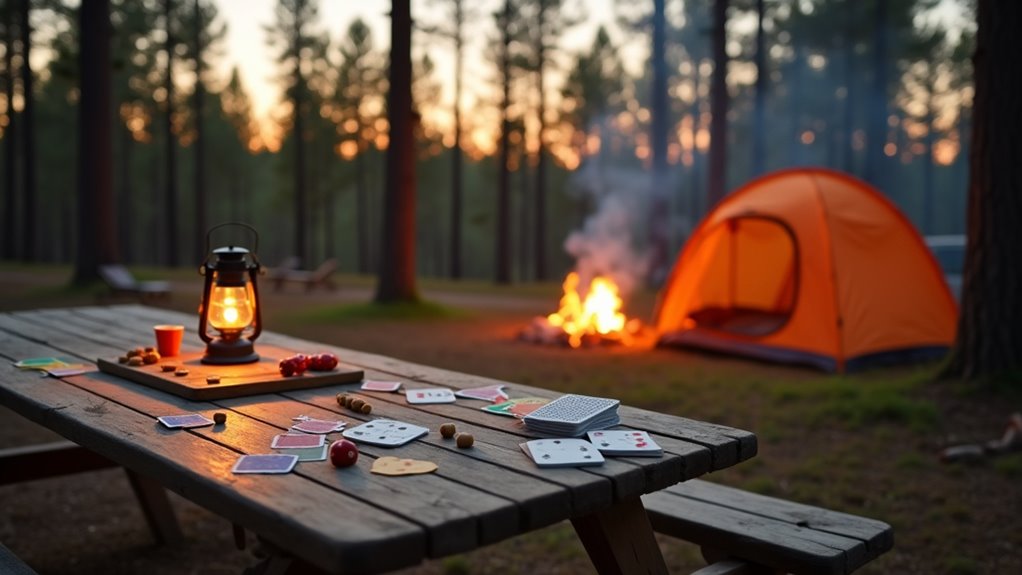
When evening settles over your campsite and the fire crackles steadily, classic card games and compact board games create the perfect bridge between outdoor adventure and cozy entertainment. Pack lightweight options like UNO, Phase 10, or a standard deck for endless poker, hearts, and gin rummy possibilities. Travel-sized versions of Yahtzee, Scrabble, and chess fit easily in your backpack without breaking your budget.
Choose games that accommodate your group size and skill levels. Card games work particularly well since they’re virtually weightless and weather-resistant when kept dry. Set up on your picnic table or inside your tent during unexpected rain.
These analog activities strengthen bonds between campers while providing screen-free entertainment that doesn’t drain batteries or require signal coverage. For even more group entertainment around the fire, consider trying campfire games that bring everyone together for memorable evening fun.
After you’ve enjoyed some quality time around the campsite, explore your surroundings through an organized nature scavenger hunt that costs nothing but delivers hours of educational entertainment. You’ll discover local flora, fauna, and geological features while engaging your observation skills.
Create your hunt list based on your camping location’s ecosystem. Mountain environments offer different treasures than coastal or desert settings. Here are essential scavenger hunt categories:
Document findings with photos rather than collecting live plants or disturbing wildlife habitats. This sustainable approach respects nature while creating lasting memories of your outdoor adventure.
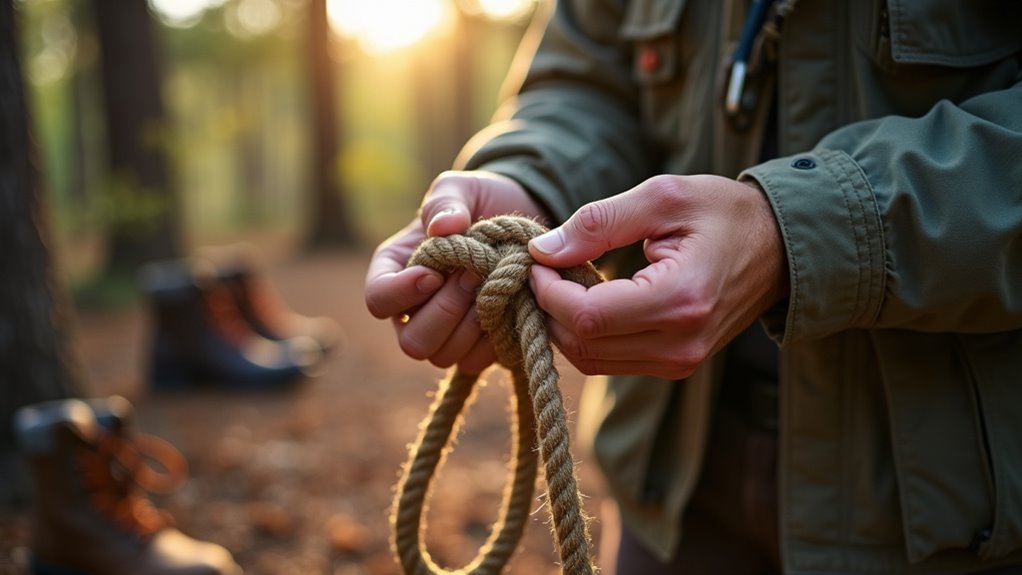
While modern technology handles most daily tasks, camping provides the perfect opportunity to develop fundamental outdoor skills that’ll serve you well in countless situations. Start with essential knots like the bowline, clove hitch, and trucker’s hitch—skills that cost nothing but practice time. Use rope from your gear bag or natural materials like vines and long grasses.
Practice fire-building techniques using different methods: friction-based approaches, flint and steel, or bow drill methods. Learn to identify edible plants and safe water sources in your region. Practice reading weather patterns by observing cloud formations and wind changes.
These skills connect you to generations of outdoor knowledge while building confidence and self-reliance. You’ll appreciate nature’s complexity while developing practical abilities that enhance every camping experience. Consider incorporating bushwalking into your camping routine as another excellent way to develop outdoor skills while exploring the natural environment around your campsite.
Few experiences rival settling into a comfortable spot outdoors with a good book and nature’s soundtrack as your background music. Reading while camping transforms your literary experience, making stories more vivid against natural backdrops. You’ll absorb content differently when surrounded by fresh air and scenic views.
Nature’s symphony and fresh mountain air turn every chapter into an immersive adventure that no indoor reading nook can match.
Choose your reading setup strategically:
Morning coffee with your book creates perfect camping moments. Evening reading by lantern light adds rustic charm to any story. You’ll discover that nature enhances every page. When it’s time to head home, remember that packing up efficiently helps preserve the peaceful mindset you’ve cultivated through your outdoor reading sessions.
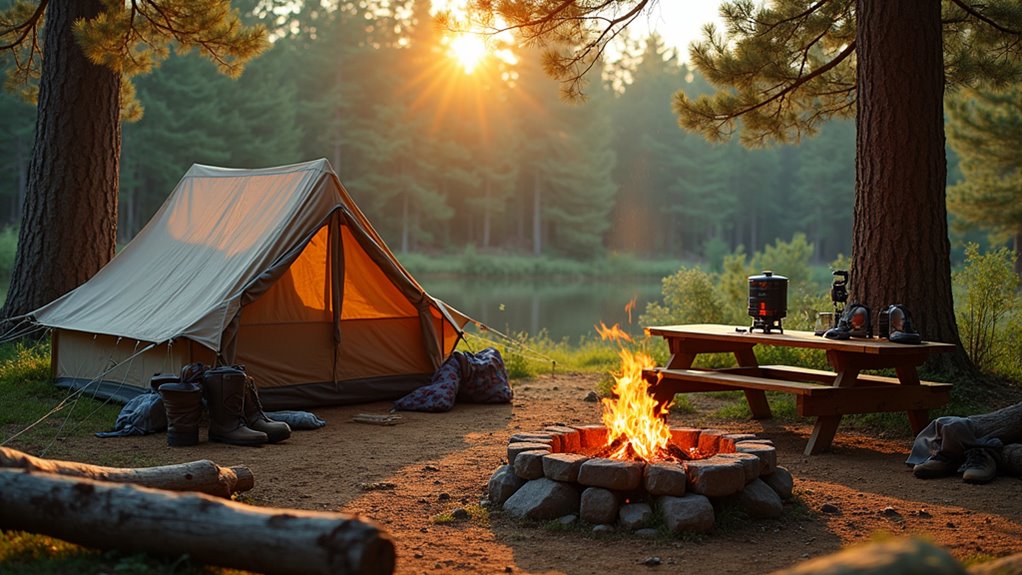
Once you’ve experienced the magic of your current camping trip, you’ll naturally start dreaming about your next outdoor adventure. Use this peaceful campfire time to research new destinations on your phone or camping apps.
Compare costs between state parks, national forests, and private campgrounds to stretch your budget further. Document what worked well this trip and what you’d change—note gear that performed poorly or meals that were hits.
Browse local visitor centers for regional camping guides and talk with fellow campers about their favorite hidden gems. Research seasonal camping opportunities like fall foliage or wildflower blooms.
Check reservation systems for popular sites that book months ahead. If you’re considering upgrading to RV camping for future trips, research thoroughly to avoid common buying mistakes that could impact your outdoor adventures. Planning your next adventure while surrounded by nature’s inspiration ensures you’ll make informed decisions and discover authentic outdoor experiences.
You’ll spend months planning the perfect camping escape to disconnect from technology and embrace simplicity, only to discover you’ve packed enough gear to fill a small apartment. Isn’t it ironic that your quest for minimalism requires maximum preparation? But here’s the twist—once you’re sitting by that crackling fire with marshmallows burning and stories flowing, you’ll realize the best camping moments can’t be planned. They just happen when you stop trying so hard.